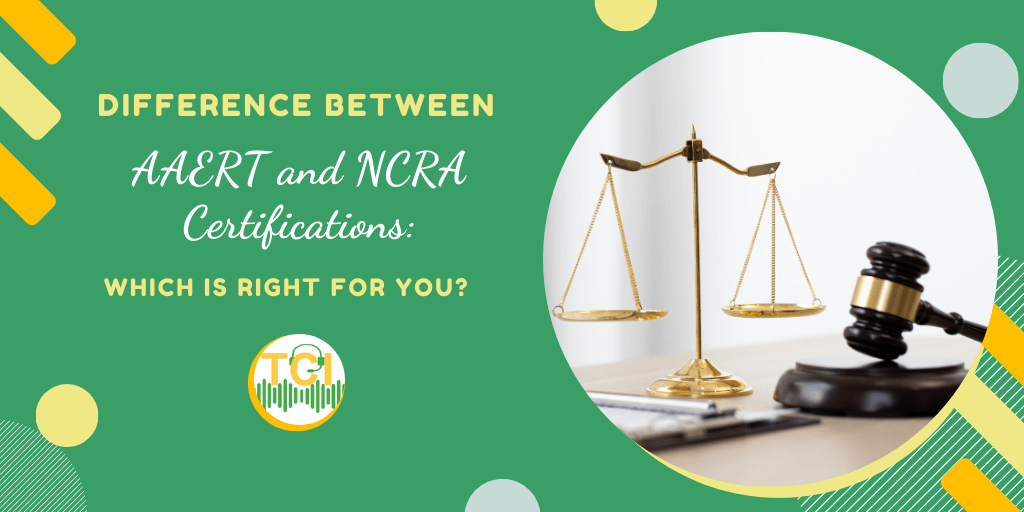⏳ 72-Hour Flash Sale Live! Use Code FLASH20 Before Time Runs Out — View Pricing | Enroll Now
Offer Ends In

In legal transcription and court reporting, certifications are benchmarks of proficiency and expertise. Certifications are more than just accolades; they represent a profound commitment to excellence and competence in specialized areas of legal proceedings. Two prominent organizations that offer certifications tailored to different aspects of these professions are the American Association of Electronic Reporters and Transcribers (AAERT) and the National Court Reporters Association (NCRA). Each organization caters to distinct skill sets and career paths—AAERT emphasizes digital recording and transcription, while NCRA specializes in stenography. Understanding these differences is not just crucial, but empowering for individuals seeking to enter or advance in these fields.
This blog delves into the distinctions between AAERT and NCRA certifications, inspiring and guiding readers through their histories, types of certifications offered, required skills, job roles, market demand, and factors to consider when choosing the right certification path.
The American Association of Electronic Reporters and Transcribers (AAERT) is a leading organization dedicated to advancing the field of digital reporting and transcription. AAERT facilitates the professional development and certification of electronic reporters and transcribers, ensuring the highest standards in capturing and transcribing legal proceedings. By providing training, resources, and a robust certification program, AAERT supports its members in delivering accurate and efficient transcription services. As of July 29, 2024, the average salary for a Court Reporter in the United States is $63,256, with a typical range between $45,641 and $82,794.
Established in 1995, AAERT was founded with the mission to standardize and promote digital recording technology within the legal system. Over the years, the association has been a strong advocate for the adoption of electronic reporting, highlighting its reliability and efficiency compared to traditional methods. AAERT continues to play a pivotal role in shaping the future of legal transcription, fostering innovation, and maintaining excellence in the field.
Professionals pursuing AAERT certifications must possess a variety of essential skills and knowledge to ensure they are well-prepared for their roles. Proficiency in digital recording technology is crucial, including the ability to operate and maintain recording equipment effectively. Additionally, a thorough understanding of legal terminology and procedures relevant to electronic reporting is necessary to accurately capture and transcribe legal proceedings. Strong attention to detail and accuracy in transcription and editing are also critical components of the skill set required for AAERT certification.
These are not just prerequisites but invaluable assets that make professionals competent and prepared for their roles. By mastering these skills and knowledge areas, certified electronic reporters and transcribers can provide reliable and efficient services in the legal field.
The National Court Reporters Association (NCRA) stands as the leading authority for professionals in stenographic court reporting and captioning. Established to uphold industry standards, the NCRA offers rigorous certification programs that validate the essential skills required for court reporters and captioners. By achieving NCRA certification, professionals demonstrate their commitment to excellence and precision in their field. Notably, the national average salary for a court reporter is $56,965 per year, reflecting the value and expertise these certified professionals bring to legal and other transcription settings.
NCRA certifications necessitate mastery of stenographic machine operation and shorthand writing techniques. Professionals must demonstrate proficiency in providing real-time transcription and captioning services and a comprehensive understanding of legal terminology and procedures crucial for court reporting and captioning.
AAERT certifications primarily center on digital recording technology and transcription methods. Professionals certified by AAERT excel in using digital recording equipment and software to capture and transcribe legal proceedings accurately and efficiently.
In contrast, NCRA certifications focus on stenographic machine operation and real-time transcription. Court reporters and captioners certified by NCRA specialize in providing verbatim transcripts in real-time, utilizing stenographic shorthand and advanced transcription techniques.
AAERT certification programs typically offer shorter and less costly training options than NCRA. Training under AAERT emphasizes:
NCRA certification programs require extensive training in stenographic theory and practice. Training for NCRA certifications involves:
Professionals certified by AAERT often serve in roles focused on electronic reporting and transcription within legal, corporate, and governmental settings. They manage digital recording equipment, ensure the clarity and accuracy of recorded proceedings, and may also be involved in the editing and distribution of transcripts.
NCRA-certified professionals fulfill diverse roles in court reporting, real-time reporting, CART services (Communication Access real-time translation), and broadcast captioning. They provide essential transcription services in legal proceedings, offering immediate access to accurate transcripts during hearings and trials.
The demand for AAERT certifications is growing in industries that prefer digital recording technology for legal proceedings. AAERT-certified professionals are valued for their proficiency in electronic reporting methods, with increasing recognition across various regions and sectors. This recognition can lead to a wide range of job opportunities and potential for career growth.
NCRA certifications are recognized in legal settings requiring stenographic expertise for accurate and timely transcription services. Professionals certified by NCRA benefit from strong recognition among legal professionals and employers seeking skilled court reporters and captioners.
Consider your career aspirations and interests in technology versus traditional stenographic methods. Determine whether you prefer working with digital recording technology (AAERT) or mastering stenographic shorthand and real-time transcription (NCRA).
Evaluate the length and cost of training programs associated with AAERT and NCRA certifications. Assess your readiness to invest in education and certification that align with your career goals and financial resources.
Research regional demand and employer preferences for AAERT or NCRA certifications in your desired location. Explore job opportunities and growth prospects in industries requiring electronic reporting or stenographic expertise.
Choosing between AAERT and NCRA certifications is crucial for aspiring legal transcriptionists and court reporters. Each certification has unique strengths: AAERT focuses on digital recording technology, ideal for tech-savvy industries, while NCRA emphasizes stenographic skills for real-time courtroom transcription.
When deciding, consider your career goals, interest in technology versus traditional methods, and training investment. Research job markets and employer preferences to align your choice with industry demands. Both certifications offer rewarding careers in legal transcription, characterized by precision and professionalism.
Ultimately, select the certification that best matches your skills and ambitions to confidently pursue a successful career in the legal field.
Achieve AAERT certification success with preparation course expertly curated by the Transcription Certification Institute. Our specialized programs are designed to help you excel in AAERT certification exams, boosting your career prospects and confidence in the competitive field of legal transcription and court reporting.
Can be better
Easy to read/ understand
Found it helpful

Your TRANSCRIPTION CAREER CAPSULE to Help You BOOST Your Potential
Latest Industry News, Jobs, Tips and More..

Comments are closed